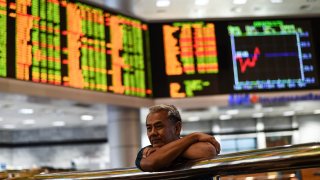
This has been CNBC's live blog covering updates on Asia-Pacific markets.
Asia-Pacific markets were mostly flat on Friday against an also muted Wall Street looking to revive its recent market rally.
It was largely negative territory for mainland China markets. The Shanghai Composite fell 0.59% to 3,258.08 while the Shenzhen Component dipped 1.27% to 12,358.54.
The Hang Seng index closed flat. There was positive action from Tencent, up 0.77% but food delivery giant, Meituan was down more than 0.7%. This week, Tencent denied offloading its stake in Meituan.
Get New England news, weather forecasts and entertainment stories to your inbox. Sign up for NECN newsletters.
After Tencent's second quarter revenue slide earlier this week, fellow tech giant NetEase offered the markets a sweetener posting a nearly 13% year-on-year increase in its second quarter net revenue, beating expectations. But its share price finished more than 6% lower.
Japan's Nikkei 225 also finished flat at 28,930.33 while the Topix index added 0.2% to 1994.52. The Kospi was down at 0.61% at close.
Japan's July headline inflation has risen to 2.6% from 2.4% in June. That was above expectations of 2.2% and higher than the Bank of Japan's goal of 2.0%.
Money Report
Compared to a lackluster start to the week, Japanese stocks were buoyant. Nissan rose 1.3% while Nikon Corp was trading higher by over 3%. Sony and Olympus were also ahead by between 2%.
The S&P/ASX 200 in Australia also ended flat at 7,114.50.
India's central bank is due to release minutes of its last monetary policy statement later on Friday.
APEC ministers meet to revive tourism for the region
Tourism ministers from regional member economies are coordinating their policies to revive the tourism and travel industry in the region, said the Asia-Pacific Economic Cooperation.
They are considering a series of policy recommendations to ensure that the benefits of tourism are distributed fairly among local communities.
These include policies to facilitate tourism journeys that are sustainable, respectful of local and traditional knowledge, and are gender-responsive.
According to World Travel and Tourism Council on Friday, the travel and tourism industry contributed to almost 11% to the total employment in the region, or about 162 million jobs in 2019.
This number dipped during pandemic, accounting for just 131 million jobs in 2020 and 138.7 million jobs in 2021.
"The havoc wreaked by COVID-19 in the past two years is certainly unprecedented and has viciously impacted the lives of everyone," Thailand's Minister of Tourism and Sports said Phiphat Ratchakitprakarn said in his opening remarks at the 11th APEC Tourism Ministerial Meeting held in Bangkok.
"However, through the last couple of years, our relevant agencies have worked hard and are still, until today, working tirelessly to achieve a swift and healthy recovery as we believe that the lowest point of the economic crisis from the pandemic is now behind us.'
"It's time for us to get back on track and move towards more positive territory."
Thailand, for example expects to welcome 10 million international tourists this year after it shut completely to visitors during the pandemic. The sector contributes to around 20% of its gross domestic product.
— Su-Lin Tan
Defense stocks rise after Kim Jong Un's sister tells South Korean president to 'shut his mouth'
Defense stocks in South Korea rose slightly after North Korean state media shut down proposals to support Pyongyang's economy in exchange for giving up its nukes.
"It would have been more favorable for his image to shut his mouth, rather than talking nonsense as he had nothing better to say," North Korean leader Kim Jong Un's sister, Yo Jong, said in the statement.
Kim called South Korean President Yoon Suk-yeol "really simple and still childish" for proposing to "barter economic cooperation for our honor, nukes."
Korea Aerospace Industries rose as much as 3.56% earlier in the session before paring gains. LIG Nex was up as much as 2.5% and Hanwha Aerospace rose as much as 1.8%.
South Korea's Unification Ministry expressed strong regret over Kim Yo Jong's statement on Yoon's plans, describing her statement as a reiteration of North Korea's intentions to continue developing nuclear weapons.
—Jihye Lee
Bank of Japan unlikely to act despite uptick in inflation, says analyst
The Bank of Japan is not expected to change its monetary policy despite an uptick in headline inflation, according to Stefan Angrick, senior economist at Moody's Analytics.
On Friday, Japan posted a lift in headline inflation to 2.6% year-on-year for July, rising from 2.4% in June.
"We don't expect the Bank of Japan to change major policy levers. The fact is that there is still little evidence of a demand driven price increases, most of what we're seeing is supply driven," Angrick told CNBC "Asia Squawk Box" on Friday.
"Wage growth hasn't really picked up all that much ... GDP that we got earlier this week showed that economies are finally back above pre-Covid levels of output — but that's compared to Q4 2019 and that's a quarter when the economy has contracted 3%," he added.
"So [there] isn't really all that much the Bank of Japan can do, it might tighten policy to bring down demand, but demand is already weak," Angrick said. "Overall, we expect them to stay on hold."
Higher gas prices take centerstage in Japan's rising costs, particularly as the Ukraine war continues to curtail gas supplies in Europe, causing import pressures of LNG to spill over to Asia Pacific. However, there are some signs of easing in commodity prices, Angrick noted.
"While it is true that you have Northeast Asian gas prices picking up, commodity prices more broadly seem to be coming down a little bit," he said.
"We're also seeing signs that global supply chain conditions seem to be improving, bottlenecks are easing, so that should help bring global inflationary pressures down a little bit."
"But even if that's true, consumer price inflation within Japan certainly won't come down right away," said Angrick. "Over the coming months, all of these things are going to come together. That's why, we expect inflation to remain at the level where it is actually towards the end of the year."
—Su-lin Tan
Malaysia’s strong economy may support fiscal consolidation after polls, Fitch Ratings says
Malaysia's recent strong economic performance may encourage a fiscal consolidation after the country goes to the polls, according to Fitch Ratings.
On Friday, Malaysia posted a 38% year-on-year increase in exports in July while its imports expanded 41.9% for the same period.
The likelihood of fiscal consolidation - efforts to reduce public debt and therefore fiscal deficit - over the next parliamentary term may increase if the election delivers a large majority to a government committed to improving public finances, Fitch said.
Some within the United Malays National Organization, the dominant party within the government, have advocated for an earlier vote than July next year.
Malaysia's second quarter year-on-year GDP growth of 8.9% may bolster such calls, Fitch added.
"However, Prime Minister Ismail Sabri Yaakob of UMNO appears keen to pass more of his agenda before dissolving parliament," Fitch said.
— Su-Lin Tan
Hong Kong economy on the mend but headwinds abound: AMRO
Hong Kong's economy is recovering after being dealt the heavy blow of a fifth wave of Covid-19 and a two-year recession, according to the international organization ASEAN+3 Macroeconomic Research Office.
"The Hong Kong economy is expected to grow modestly by 0.3% in 2022 before expanding strongly by 3.9% in 2023," AMRO director Jae Young Lee said on Friday.
"In the near term, there are multiple headwinds from the global growth slowdown, the U.S. interest rate hikes, and heightened geopolitical tensions. Hong Kong also faces several long-term structural challenges which require bold policies and fiscal resources to address."
Economic growth in the second half of the year and in 2023 will be boosted by the reopening of Hong Kong's borders, internationally and with mainland China. But a wider global slowdown — including that of China will retreat recovery, said AMRO.
There will be a limited pass-through of imported inflation, it added.
AMRO said Hong Kong's role as a "super-connector" between mainland China and the rest of the world was key to its economy and financial system.
"In this context, Hong Kong's application to join the Regional Comprehensive Economic Partnership is an important move," it said.
—Su-Lin Tan
Slowdown in global semiconductor sector underway: ANZ analyst
A slowdown in the global semiconductor cycle is underway, ANZ Research said in a note.
"The electronics manufacturing PMI suggests that while activity is still in expansionary mode, it is past its peak and will slow down further," ANZ Research Bansi Madhavani said in the note on Friday.
"Asia's electronic-oriented economies are signaling weakness in activity."
The big players Taiwan and South Korea have softening Purchasing Managers Index or manufacturing sentiment, and companies expect the industry to enter an "inventory-rebalancing phase over the coming months", Madhavani noted.
"Headwinds to Asia's electronics trade are rising in the coming months, but some segments will be more affected than others. This is likely to bring about a soft landing for Asia's overall electronics trade," Madhavani said n the note.
— Su-Lin Tan
Sri Lanka's central bank governor sees country's inflation peaking around 60%
Inflation in Sri Lanka will peak of just above 60% in September, central bank governor Nandalal Weerasinghe told CNBC's "Squawk Box Asia" — a shift from his previous forecast last month.
The central bank held rates steady Thursday on cautious optimism on the defaulted economy, which the governor said "was based on revised inflation expectation that's improved a lot compared to earlier."
"It will not be reaching 70%, in fact, it will be reaching a peak just above 60% and it will be trending down from September onwards towards next year," he said.
He reiterated a "wait-and-see" approach for the damaged economy, saying markets have shown an upward trend compared with the last cycle.
On the crippled economy's supply shortage, he claims the situation has gotten much better.
"Right now, the situation has improved a lot. There are no more queues for petrol, diesel, gas," he said.
NGOs such as Human Rights Watch recently expressed concerns the country's dire situation is driving millions of people into poverty. The International Monetary Fund is expected to restart bailout talks with the country later this month in hopes of securing a $3 billion funding.
— Jihye Lee
Manufacturers like those making refrigerators could offer value in weak China market
Manufacturing companies, including those making whitegoods such as aircon and refrigerators, may offer investment value in a weak Chinese market, according to William Ma, Grow Investment Group, chief investment officer.
"These companies will benefit from tax reduction, tax cuts ... they have the highest possibility for an earnings upgrade especially if commodity prices come down," Ma told CNBC's "Street Signs Asia" on Friday.
Those making whitegoods will benefit from more retail spending driven by government-issued spending coupons. Many of them are trading at a reasonable valuation, he added.
"I believe whitegoods and refrigerators will benefit from this round of stimulus," Ma said.
As for the tech sector, Ma noted many stocks will be re-rated, as the "high growth era is gone" and it won't be until 2023 or 2024 that they will again be re-rated in a "high way".
— Su-Lin Tan
China GDP growth lethargy in motion, says economist
On Thursday, both Goldman Sachs and Nomura downgraded their forecasts for China's GDP growth citing weaker demand, uncertainties stemming from zero-Covid policy and an energy crunch.
Capital Economics senior China economist Julian Evans-Pritchard also said in a note on Thursday that prospects of a post-Omicron rebound for China were poor, especially against a backdrop of a spiraling housing market and slow credit appetite despite policy easing.
"More support is on its way but it will probably be too late too little to prevent output from stagnating this year. And once the economy does return to growth, it will be at a slower pace than in the past," he said.
China's current economic problems would worsen if not for exports that have boomed lately, Evans-Pritchard said.
But there are signs that demand is now dropping due to a global economic slowdown and a reversal in the pandemic-induced shift toward goods consumption, he added.
The Chinese central bank surprised this week with a 10 basis point cut to its key interest rate on Monday.
"We now expect two more 10 basis points cuts over the remainder of this year and continue to forecast a RRR cut next quarter. These moves will be largely symbolic, however," Evans-Pritchard said.
"The PBOC wants to reassure market participants and its political bosses in Zhongnanhai that it is taking action to shore up the economy. But in practice, the central bank still appears reluctant to slash rates on the scale needed to make a meaningful difference to loan demand," he added.
— Su-Lin Tan
CNBC Pro: Investment pro says 'don't be a hero' in markets
Market veteran Nancy Tengler says talk of a new bull market is premature, as she names the "reliable" stocks she likes right now.
"I think this rally has been excellent," Tengler, who is CEO and chief investment officer of Laffer Tengler Investments, told CNBC "Squawk Box Asia" last week. "But I don't think we're off and running in a new bull market."
She named several tech stocks that she thinks are "more reliable growers" — companies with a proven track record of growing earnings and dividends.
Pro subscribers can read the story here.
— Zavier Ong
CNBC Pro: Veteran strategist David Roche shares his views on the market rally
U.S. markets have picked up from their mid-June lows in recent weeks, but strategist David Roche believes current support for the market is set to run out.
Speaking to CNBC earlier this week, Roche, head of research firm Independent Strategy, said he thought the rally was "probably 75% over now."
Pro subscribers can read more here.
— Jenni Reid






